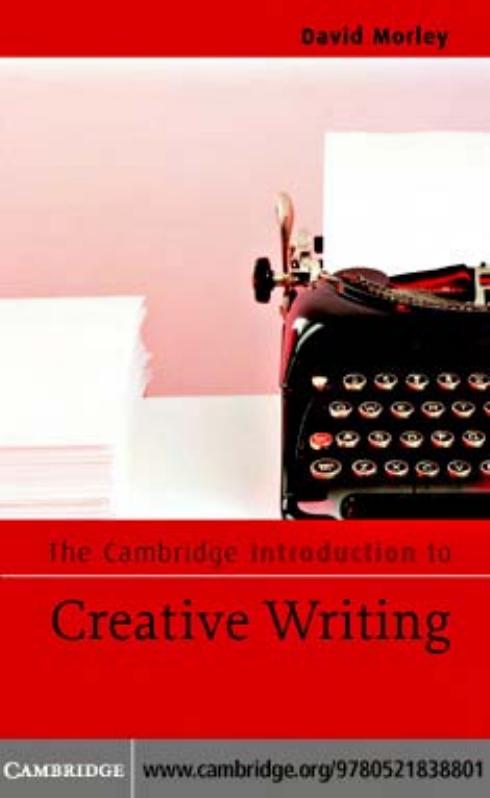The Cambridge introduction to creative writing by David Morley

Author:David Morley [MORLEY, DAVID]
Language: eng
Format: epub, pdf
Tags: General, Reference, Language Arts & Disciplines, English language, Literary Criticism, Composition & Creative Writing, Writing Skills, Creative writing, Rhetoric, English language - Rhetoric, Report writing, Semiotics & Theory, Problems; exercises; etc
ISBN: 9780521838801
Publisher: Cambridge University Press
Published: 2007-12-15T04:10:59.676000+00:00
136
Creative writing
also in economy and clarity. Hemingway received his training on the Kansas City Star: ‘On the Star you were forced to learn to write a simple declarative sentence. This is useful to anyone. Newspaper work will not harm a young
writer and could help him if he gets out of it in time’ (Phillips, 1984: 38).
Deadlines demand concision and conclusion; at some point, a piece of writ-
ing is as complete as it can be. The threat and the reward hanging over that final process are usually external factors. Academic years trot their tidy schedules; newspapers net their copy; publishers pump out books on schedule, in tandem
with the schedules of their marketing and sales departments. In the middle of these demands, the writer sits with their stalled or stilted creations, with both eyes on the clock. I suggest you seize back the initiative, and use the power of time as a motivation to write. By setting your own deadline (it must be earlier than the official deadline), you take control of the process psychologically. You will also learn to appreciate how your deadline then gives form to the way you write and even to how you conduct your life around that, as we explored in the section on discipline.
Your challenger
Drafting requires objectivity of a sort, so you may choose to disembody yourself; become impersonal; or even play somebody else, some other writer that is used to overcoming this moment and pressing on with the next draft. You might even view the creative act of drafting as a journalist turning in their copy. Having a real deadline imposed by somebody else is useful here. Writing then becomes a job, not a chore, not yet an art – which is liberating. The reward is completion combined with a fee or, in a student’s case, what you hope will be a good
grade. It is tough, in the beginning, to motivate yourself by inventing some reward for completing your work by a deadline. In which case, have someone
external to yourself devise and set that deadline in order to have the reward of their approbation. Writers often use their partners for this role, but these relationships must be demonstrably robust to survive such role play, especially if the stakes are high. I know many writers who are unremittingly cruel in this regard. How you do this will depend, therefore, upon the trust between you
and your challenger (a better word); and the level of obsession you are able to bring to the table, and the level your challenger is willing to put up with.
Precisions of process
Most of the ways we express ourselves in prose and in speech are imprecise;
tangential at best to what we intend to say and mean. We all know the frustration Processes of creative writing
137
of not having said what we intended; of not having communicated what you
felt was your version of a truth. However, writing gives you time for rehearsal, and time to get your words as right as possible. Clarity is crucial; it is a desirable quality in writing.
Download
The Cambridge introduction to creative writing by David Morley.pdf
This site does not store any files on its server. We only index and link to content provided by other sites. Please contact the content providers to delete copyright contents if any and email us, we'll remove relevant links or contents immediately.
Asking the Right Questions: A Guide to Critical Thinking by M. Neil Browne & Stuart M. Keeley(5751)
Autoboyography by Christina Lauren(5221)
Eat That Frog! by Brian Tracy(4509)
Dialogue by Robert McKee(4385)
Sticky Fingers by Joe Hagan(4181)
Journeys Out of the Body by Robert Monroe(3608)
Annapurna by Maurice Herzog(3460)
Full Circle by Michael Palin(3437)
Schaum's Quick Guide to Writing Great Short Stories by Margaret Lucke(3368)
Elements of Style 2017 by Richard De A'Morelli(3336)
The Art of Dramatic Writing: Its Basis in the Creative Interpretation of Human Motives by Egri Lajos(3057)
Why I Write by George Orwell(2944)
Atlas Obscura by Joshua Foer(2943)
The Diviners by Libba Bray(2925)
The Fight by Norman Mailer(2921)
In Patagonia by Bruce Chatwin(2915)
The Mental Game of Writing: How to Overcome Obstacles, Stay Creative and Productive, and Free Your Mind for Success by James Scott Bell(2894)
Venice by Jan Morris(2565)
The Elements of Style by William Strunk and E. B. White(2464)
